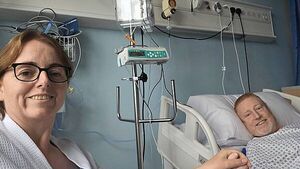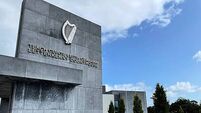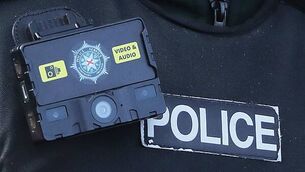Treble organ recipient believes new law will give hope to many

Louise Walsh
A double lung transplant recipient, who underwent a further gruelling operation for a new kidney last year, says the new opt-out law for organ donation will give hope to so many currently on waiting lists.
David Crosby, who also lost three siblings to breathing problems, is urging everyone to have a conversation with loved ones on the gift of organ donation, which he believes may have also saved the life of one of his brothers, who was on a waiting list for a heart and lungs.
From Tuesday, it will be assumed that a person wants to donate their organs when they die unless they have objected to the process while they were still alive.
It is believed the new system will increase the donor pool of organs for over 600 people currently on the donor list.
The opt-out rule has been welcomed by treble organ recipient David Crosby (50), whose new lease of life means he is back in training to take part in the marathon in Chicago in October.

After receiving a double lung transplant in 2016, a critical bout of Covid-19 which left him in an induced coma to save his life also irreparably damaged his kidneys and meant he was on dialysis three times a week for acute renal failure. until a new donor could be found.
Incredibly the donor turned out to be his wife Katie and now the couple are in training together to take part in the US marathon.
"Katie's kidney hit most of the markers they need for a good match but I have to admit, I had reservations as I was afraid of her going through a transplant," said David, who hails from Meath Hill but now lives with his family in Kingscourt, Co Cavan.
"This new law is great and will give a lot of hope to people on waiting lists who are just wishing for their chance of life to happen by getting a suitable organ. When it comes to you, it is everything.
"A bigger pool of organs will speed up the whole process for people.
"Often people just forget to get a donor card but would like to donate organs and this new law means that is possible. However there is still a way out for people because ultimately the families of the deceased can still say no after death."
"I think it is still so important with this new bill for people to discuss their wishes with their next of kin because regardless of the register, the next of kin is always asked for the final decision."
Although David was lucky enough to get a double lung donation, needed due to an irreversible condition called idiopathic Pulmonary Fibrosis, he lost three siblings at a young age due to a similar condition.
Tragically, his siblings Regina and Paul both passed away before the age of two years old with breathing problems.. His brother Ciarán was diagnosed at 10 days old with a lung condition called Fibrosing Alveolitis and sadly died when he was 11 years old.
"I wish they could have had the chance I did at organ donation. Ciarán was on the transplant list for heart and lungs and unfortunately it didn't happen so we, as a family, know both sides of receiving and not receiving that life changing gift of donation.
Now David, who overcame the odds to run three marathons after his lung transplants, is going for gold by attempting to walk the Chicago marathon with his wife.
"I'm hoping I can finish it. The last marathon that I ran, my lung capacity was 94% and now it is down to 35% so it is going to be extremely hard. At the moment, I'm walking and taking kilometre by kilometre to strengthen myself.
"I don't think Katie will wait for me," he laughed.
"My lungs were donated by a deceased donor to whom I will always be grateful but my kidney was donated by my best friend and life partner. I feel like I'm the luckiest man in the world."





